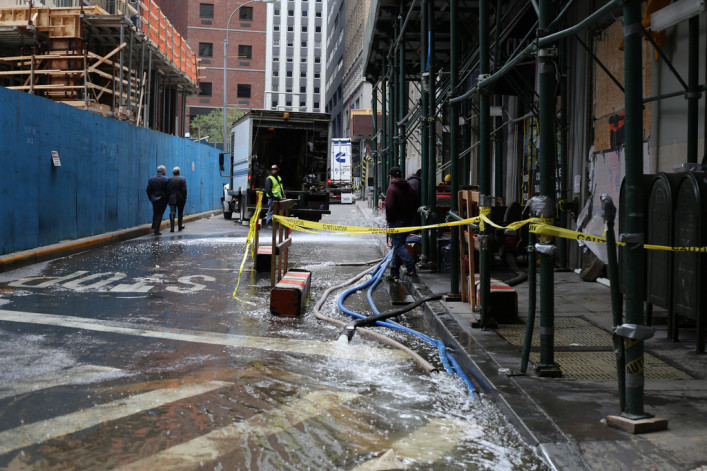Ask an Expert: Can we renegotiate the price because of Hurricane Sandy?

Q. My mom is in contract for a co-op in a neighborhood severely damaged by Hurricane Sandy. Her building had minimal damage and there was none to her unit, but real estate agents I have spoken to say the local real estate market is 'toxic' and could take several years to recover.
I am concerned that the property value has greatly decreased and what she negotiated on in September greatly changed when the storm hit.
Does she have any chance to renegotiate the price?
Her attorney said he could try, but also asked on what grounds does she want the price negotiated. I told him unusual circumstances due to a major storm that has greatly affected home prices.
He has a very good relationship with the other attorney and the management company. In my opinion, he wants to keep peace and is not offering clear advice or direction. He said this is uncharted territory and he is not sure what to tell me.
I am at a loss on how to proceed. If you have two cents to share, I am all ears.
A. In light of the fact that neither the building nor the apartment was materially damaged, there is likely no legal way out of the contract, says real estate attorney Jeffrey Reich of Wolf Haldenstein Adler Freeman & Herz.
Instead, our experts suggest that you and your mother take a page from 2008, when the real estate market took a sudden downturn following the collapse of Lehman Brothers and the subsequent credit crisis.
"Property values immediately dropped and purchasers were concerned that it would take years for values to recover," says Reich. "Some purchasers who had entered into contracts and made deposits--customarily 10% of the purchase price--walked away from their deposits after determining that the value of the property had decreased by far more than 10%. Or they renegotiated more favorable pricing."
Our experts put forward some strategies to consider.
If your mother has taken a mortgage, there is "usually a re-inspection by the bank, and there could be an appraisal downgrade," says Manhattan closing attorney Karen S. Sonn of Sonn & Associates
If the appraisal comes in lower, that could give you some leverage for renegotiating, says Roberta Axelrod, an asset manager at Time Equities.
Alternatively, says Axelrod, "sometimes just saying that the buyer will not proceed without a price concession works....This was commonplace after the market collapse in late 2008 and many sellers did make price concessions. It will probably come down to how market conditions are and whether the seller is willing to remarket the unit if you walk away from your deposit, or if, for instance, the seller needs to close before the end of the year or is moving somewhere else and will have to take a hit to have the property close."
Real estate broker Shirely Hackel of Warburg Realty says this tactic may be more effectively carried out by your mother's real estate broker than her lawyer, unless the lawyer was the one who negotiated the price to begin with.
"You need an experienced broker who can skillfully convey to the other side that while the buyer still wants to go forward with the deal, they no longer feel as confident as before, and needs something to remain in the deal happily," says Hackel.
Rather than face the prospect of having the buyer walk away from their deposit and having to market the property all over again in a more difficult selling environment, the seller may reopen negotiations.
In her experience, says Hackel, when there is a material change from the time a contract was signed (including an unexpected sharp rise in maintenance or unanticipated large assessment), sellers "generally listen to reason. With good will on both sides, the brokers can bring buyer and seller together to a mutually satisfactory retrade."
Trouble at home? Get your NYC apartment-dweller questions answered by an expert! Send us your questions.

























